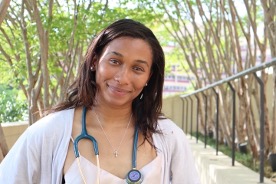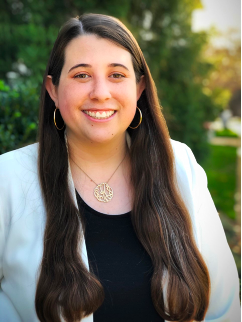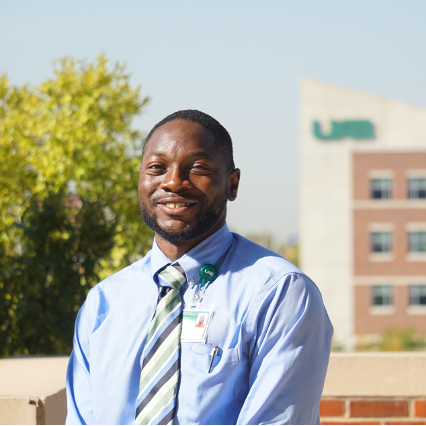As their first year of medical school comes to an end, our student co-contributors reached out to a few of their fellow MS1s to chat about what this year has meant to them, what they’ve enjoyed the most, and how it has lived up to, or differed from, their expectations. Read about their reflections here!
Audria Wood, General M.D. Program

1. What surprised you the most about medical school?
The culture and environment. I always felt like as a premed we worked hard to become doctors. First step: get to medical school then get a residency program. But we often skipped over what medical school itself would be like. There was always the grand idea of being hyper competitive, working/studying all the time, and just making the best of it. I felt welcomed by a sense of community at orientation. You’re offered plenty of resources. MSS is super supportive. Every department is engaged. The interest groups and service organizations are great activities to be a part of. There are challenges, but it is still very enjoyable. I enjoy going to class because I enjoy the people and relationships I build on campus.
2. What has been your favorite block so far and why?
My favorite block was Cardio. I really enjoyed the block directors and the content just clicked. But I think the timing had the most significance. It’s the first organ module, where you begin practicing everything from prior experiences and fundamentals. You begin working on real medical problems and reasoning through diagnosis and treatment. I truly felt cemented in medicine—like wow I’m doing it!?
3. If you are part of any special pathways offered (rural medicine, urban underserved, etc.), please describe what made you apply for that track.
I’m not on any particular track. I’m a general M.D. admitted student assigned to the Birmingham campus.
4. Any plans for the summer?
I have applied to the MSSRP program to fund my research in the Orthopedic Surgery department. I will also use my time to shadow and further explore other surgical specialties.
Kendall Campbell, Primary Care Track

1. What surprised you the most about medical school?
I was most surprised with how easy it is to have clinical experiences throughout the first year! I came into medical school thinking the first two years would be mostly spent studying crazy amounts of lectures and taking exams, with very little clinical exposure prior to third year. However, that was not the case at UAB. I am a part of the Primary Care Track which incorporates early clinical training starting our second semester of medical school, which involves being paired and working with two preceptors at the Tuscaloosa campus. In addition to that, there are tons of shadowing opportunities in many different specialties sponsored by interest groups, multiple clinical outreach volunteering options through the Equal Access programs, scholar programs that incorporate early clinical training, and our ICM course gives us multiple opportunities to interact with patients in a clinical setting within the first semester of classes.
2. If you are a part of any of the special pathways offered, please describe what made you apply for that track?
I am a part of the Primary Care Track (PCT) as well as the CU²RE program. I knew going into medical school that I would prefer having more longitudinal care opportunities during my clinical rotations and that is initially what led me to apply to the PCT. I also believe that having a strong foundation in primary care is greatly beneficial to any specialty I decide to pursue. It was also convenient that the CU²RE program overlaps the PCT in terms of several requirements, but also enriches the PCT experience by giving me a deeper understanding as a future physician in how to better meet the needs of urban underserved and rural communities in Alabama.
3. What has been your favorite block so far and why?
For me, it is a close tie between Micro and Cardio, but I think Micro is probably the winner. I found it the most enjoyable block to study for, the content was very well organized, there were tons of resources to help with the material, the directors (Dr. Patel and Dr. Walker) were the most engaging and easy to follow lecturers I’ve had so far in medical school, and the content was just way more interesting. It’s basically a month full of bacteria, viruses, and parasites. It also helped that it was the last block of Fundamentals, and you walked out of that final headed straight to winter break!
4. Any plans for the summer?
I’ll be spending 6 weeks of summer doing the CU²RE program/attending Camp PCT. Other than that, I hope to rest, catch up on all my shows I’ve gotten behind on, and hopefully go on a spontaneous trip or two!
Leo Nkengbeza, General M.D. Program

1. What surprised you the most about medical school?
Before I started medical school, I had the notion that it takes over your life, but I find myself being more productive with my free time than I used to be when I wasn’t in medical school. I decided early-on to be organized. Anytime I have free time I make sure to block it out on my calendar and map out my day in advance. If I have any gaps between lectures or mandatory activities, I’ll schedule a workout or hangout with friends. I deliberately use my time outside of studying to draw, watch anime, games, or play basketball. Medical school made me more of a planner and put more emphasis on maintaining a healthy schedule. Organizing my schedule this way helped my “workaholic” habit and makes the most of my free time.
2. What has been your favorite block so far and why?
Cardio was by far my favorite. The block directors (Dr. Doppalapudi and Dr. Litovsky) did a great job and organized the block very well. They were very passionate about interacting with students and taught the material extremely well. (I’m a little biased as a former cardiovascular medical assistant, so I already had piqued my interest in cardiology. I was in my comfort zone in this block.)
3. If you are part of any special pathways offered (rural medicine, urban underserved, etc.), please describe what made you apply for that track.
I applied to be in the CU²RE program because I have a profound interest in Alabama rural populations. Coming from an immigrant background and growing up in a poor neighborhood resulted in a familiarity with the social determinants of health. There are huge needs to address in Alabama, and I wanted to be privy to these needs and get connected to ways that I can help. I applied outside of the primary care track, and I’m excited for the longitudinal experience with a preceptor at a local clinic and following patients. It is a very valuable experience to increase my skills interviewing patients.
4. Any plans for the summer?
I’ll be taking two special topics courses - one I designed and will involve shadowing my CSS, Dr. Tanner, a trauma surgeon, and the other is working with EAB, our student-run free clinic. I’ll also be researching congenital heart disease and working with our new UAB chapter of Socially Responsible Surgery to hopefully implement an art-focused service project. I have a few mandatory sessions for CU²RE involving shadowing my preceptor and some team-building activities. I’ll also be getting peer mentor training through MSS to be a tutor next year. I’m the president of Companicures, so I’ll also be setting up volunteer opportunities for the summer and the upcoming fall semester.